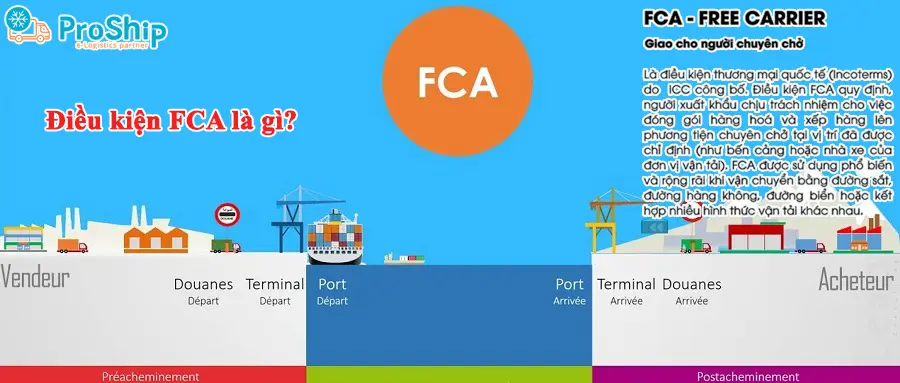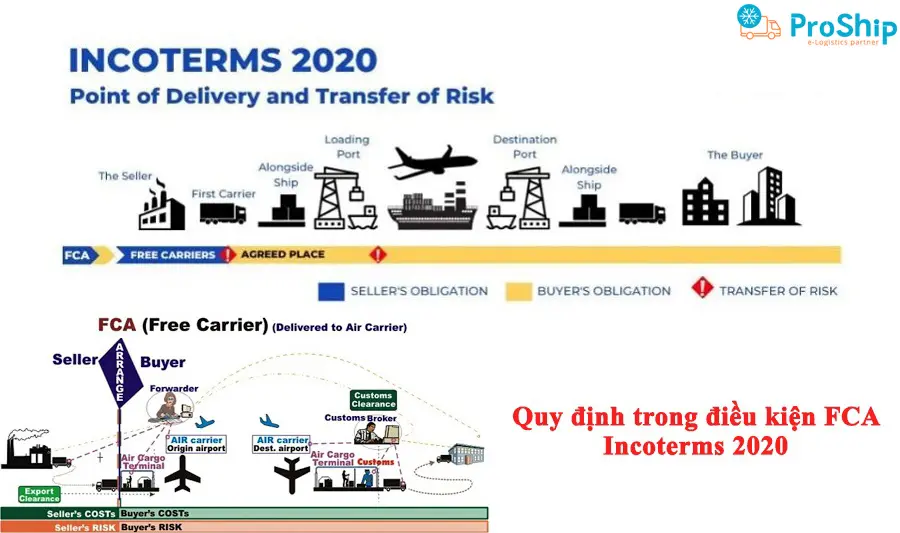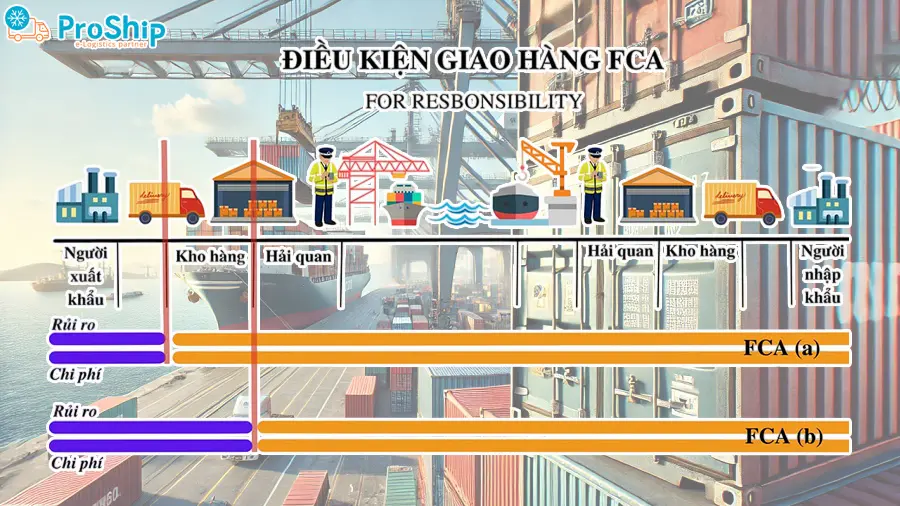x Doanh nghiệp bạn đang quan tâm và muốn tìm hiểu điều kiện FCA cùng những quy định của FCA trong Incoterms?
x Bạn cần nắm bắt những nội dung có trong FCA bao gồm những gì?
x Bạn muốn biết điều kiện FCA mang lại ưu điểm gì và có nhược điểm gì không?
Proship.vn chúng tôi sẽ thông qua bài viết sau đây để làm rõ khái niệm FCA là gì, những quy định chi tiết về điều kiện FCA là gì, đóng vai trò thế nào. Bên cạnh đó là một số ưu điểm được đưa ra để chứng minh FCA vượt trội hơn so với các điều kiện khác của Incoterms 2020.
Điều kiện FCA là gì?
FCA là gì? FCA (Free Carrier) là một trong những thuật ngữ quan trọng trong Incoterms 2020. Vậy tóm lại, điều kiện FCA là gì?

FCA (Free Carrier) là điều kiện thương mại quốc tế trong nhóm F của Incoterms 2020, là người bán giao hàng đã thông quan xuất khẩu cho người mua tại địa điểm thỏa thuận. Trách nhiệm và rủi ro chuyển từ người bán sang người mua khi hàng được giao cho người chuyên chở do người mua chỉ định.
Nội dung của điều kiện FCA gồm những gì?
Nội dung của FCA là gì, bao gồm những gì? Câu trả lời là:
Phương thức vận tải
Điều kiện FCA áp dụng cho vận tải đường bộ, vận tải hàng không, vận tải đường biển,…
Nơi giao hàng
Giao hàng cho người chuyên chở là hàng hóa được giao cho người mua qua: Địa điểm giao hàng là cơ sở của người bán; Địa điểm giao hàng không phải là cơ sở của người bán.
Chuyển giao rủi ro
Điểm giao hàng trong điều khoản FCA không chỉ là điểm chuyển giao hàng mà còn là điểm quyết định việc chuyển giao rủi ro từ người bán sang người mua. Chi phí và rủi ro liên quan đến hàng hóa thuộc trách nhiệm của người mua.
Nghĩa vụ thông quan XNK
Theo điều khoản FCA, người bán sẽ làm các thủ tục hải quan thông quan xuất khẩu. Song người bán không chịu trách nhiệm thông quan nhập khẩu, thông quan hàng hóa khi đi qua quốc gia thứ ba, trả thuế nhập khẩu hoặc các chi phí liên quan đến thủ tục hải quan nhập khẩu.
Vận đơn với dấu On-board trong mua bán FCA
Mua bán theo điều kiện FCA, có thể xảy ra trường hợp người bán cần vận đơn với dấu “On-board” dù tại thành phố nhận hàng không có cảng biển. Trong Incoterms 2020, FCA điều chỉnh cho phép người mua chỉ định người vận chuyển phát hành vận đơn “On-board” cho người bán.
Quy định trong điều kiện FCA Incoterms 2020 chi tiết nhất
Điều kiện FCA là gì đã được lý giải và những quy định về nghĩa vụ, trách nhiệm của người bán và người mua cũng được ghi nhận trong bảng sau:
| CÁC NGHĨA VỤ | NGHĨA VỤ NGƯỜI BÁN | NGHĨA VỤ NGƯỜI MUA |
| Nghĩa vụ chung | Người bán phải giao hàng hóa, hóa đơn thương mại và chứng từ | Người mua phải trả tiền hàng như thỏa thuận hợp đồng. |
| Giao hàng |
|
Người mua nhận hàng từ địa điểm vào thời gian thỏa thuận. |
| Rủi ro | Chịu mọi rủi ro đến khi hoàn thành việc đặt hàng tại địa điểm và thời gian đã thỏa thuận. |
|
| Vận chuyển |
|
Ký kết và chi trả mọi chi phí cho hợp đồng với hãng vận chuyển.
|
| Bảo hiểm | Người bán không có nghĩa vụ mua bảo hiểm hàng hóa. | Người mua không có nghĩa vụ bảo hiểm hàng hóa. |
| Chứng từ giao hàng và vận chuyển | Bằng chứng giao hàng và chứng từ vận chuyển nếu người bán kí kết hợp đồng vận chuyển. |
Kiểm tra và xác nhận mọi bằng chứng về việc giao hàng.
|
| Thông quan xuất khẩu và nhập khẩu | Làm thủ tục hải quan và trả phí cho thông quan xuất khẩu. Hỗ trợ thông quan nhập khẩu. | Hỗ trợ thông quan xuất khẩu. Thông quan nhập khẩu và thủ tục. |
| Kiểm soát | Người bán kiểm soát số lượng, trọng lượng, nhãn hiệu và đóng gói hàng đúng quy chuẩn. | Không có nghĩa vụ. |
| Nghĩa vụ về chi phí | Người bán chịu mọi chi phí để vận chuyển hàng tới khi giao hàng tại địa điểm thỏa thuận, gồm:
|
Người mua chịu mọi chi phí từ thời điểm nhận hàng tại điểm thỏa thuận:
|
| Thông báo |
Thông báo đã giao hàng hoặc không thể giao hàng cho người vận chuyển.
|
Chỉ định người vận chuyển, thời gian, phương thức vận chuyển và địa điểm nhận hàng. |

Ưu, nhược điểm của điều kiện giao hàng FCA
Ưu, nhược điểm của FCA là gì? Proship giải đáp như sau:
Ưu điểm của điều kiện FCA
Ưu điểm của điều kiện FCA là gì? Đó là:
- Để chi phí không bị bên bán kênh lên quá cao, bên mua cần nắm chi phí phát sinh thực tế trong vận chuyển và bốc xếp hàng hóa;
- Với chi phí phát sinh khi thực hiện trách nhiệm, bên xuất khẩu có thể nâng cao giá bán hàng lên;
- Người mua không cần lo lắng vấn đề thông quan hàng hóa.

Nhược điểm của điều kiện FCA
Điều kiện FCA vẫn có nhược điểm:
- Khi hàng được giao và thông quan thành công, bên mua phải làm bảo hiểm cho lô hàng và tiếp nhận rủi ro;
- Người bán phải chịu thêm khá nhiều rủi ro;
- Người mua cần cung cấp chuẩn xác nơi giao hàng thực tế.
Proship Logistics chúng tôi đã cung cấp cho người bán, người mua kiến thức cần biết về điều kiện FCA là gì cùng những quy định của FCA là gì. Nếu bạn có thắc mắc nào liên quan tới “Free Carrier” hoặc các thuật ngữ chuyên ngành XNK khác, liên hệ 0909 344 247 để được giải đáp và tư vấn các Dịch vụ vận chuyển hàng Đa phương thức giá rẻ tốt nhất.

KIEN THUC RAT BO ICH GIUP NGUOI DOC HIEU RO CAC TRACH NHIEM CUA BEN MUA VA BEN BAN
Cảm ơn c đã nhận xét